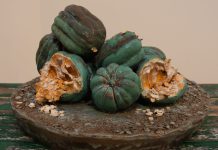Uchida, who died March 29, is the recipient of the highest honor
a civilian can receive
Gilroy – Better late than never.
More than 50 years since Zenichiro Uchida brought the first wave of Kagoshima immigrants from Japan to America after tirelessly campaigning the U.S. government to give them a chance for a better life – the sacrifices he made have been recognized by the office of the Emperor.
Uchida, 84, died March 29 – four days after learning he was the recipient of the Order of the Rising Sun, Gold and Silver Rays – the highest honor a civilian can receive.
“We won,” he said upon hearing the news, recalled his son Ted. “He told my mother (Shizuko) to keep her head high and to go to the Emperor’s palace with me – that it was the best honor we could do for him.”
The Consulate General of Japan’s Office in San Francisco is holding a special ceremony June 8 for Uchida’s family and friends to receive the medal. Only three other individuals in the U.S. will receive the award this year.
“I invited the people that my dad would have wanted to invite,” Ted said. “We’re very, very humbled and honored. So many people wanted for him to get an award, and so many people will be glad. It’s something that even though my dad wasn’t expecting it – he had somewhat given up on.”
During World War II Uchida served as a second lieutenant in the Japanese Imperial Army and surrendered to the American troops in the Philippines. He was surprised by their kindness and returned to convince other soldiers hiding in the mountains to do so instead of dying there.
Uchida believed life had more to offer, Ted explained.
He was sent to California on a cultural exchange program in 1953 to learn American farming techniques. The experience inspired him to immigrate to the U.S. and upon returning he convinced others of the opportunities abroad.
He started a letter writing campaign to the U.S. Congress that made hundreds of visas available to Japanese immigrants.
But life wasn’t easy for the original 325 men who chose to leave their homeland.
They struggled in labor camps the first three years. Many suffered from homesickness. But it was Uchida who kept up moral by traveling back and forth to Japan, consoling and encouraging their families. Many immigrants chose to settle in the Central Valley, becoming successful flower growers. Uchida acted as a father to all of the children who came from Japan.
Bob Uemura was one of them. He came to the U.S. at age 7 after his father became convinced that their future lay in California.
“If it weren’t for Mr. Uchida we just wouldn’t be here. That’s the bottom line,” said Uemura, who grew up to become the first attorney from Kagoshima immigrants. “He not only brought us here, he nurtured us – he cared about us to the very end.”
Uemura’s mother suffered from tuberculosis – a disease that prevented immigrants from entering the U.S. But Uchida had influence over the doctor who examined his mother and she was allowed into the country.
“He did miracles,” Uemura said. “I used to tell Ted, ‘Your father is a man who could move mountains.’ Mr. Uchida didn’t personally benefit from any of this. He found a way so that we could come here legally. My parents thought he was a god.”
Uchida traveled throughout California, checking up on the immigrants he convinced to come here.
“Mr. Uchida would come over and talk to us about this new industry in Salinas growing flowers,” Uemura said. “My father believed in him so much he said, ‘Let’s go.’ My father had no experience growing flowers.” But he moved his family up from Azusa and became a successful carnation grower.
He was not alone.
Since 1978, Uchida himself owned and operated the Zen Flower Garden on Monterey Road. And during the 1980s, he began a sister city program between Gilroy and Takko-Machi, Japan.
The number of Kagoshima immigrants he is credited to bringing to the U.S. has grown from 325 to about 1,500 as he continued to petition for more visas. Uchida is considered the father of postwar immigration from Japan and for helping to establish goodwill between the two nations. The award honors his life-long dedication to the cause.
“Candidates undergo very heavy scrutiny,” said Kabir Archuletta, a spokesperson for the Consulate General of Japan’s Office in San Francisco. “Once the consulates make recommendations to the Emperor’s office it’s not necessarily guaranteed.”
Since his death, Uchida’s wife has grown ill and Ted, who served as his father’s hands and voice through the years, is helping his mother recover. The business he has run for his father has been closed since his father’s death. They hope to reopen later in June after the ceremony.
“My only regret is I wish he could have enjoyed it,” Uemura said. “For him it wasn’t an award for him, it was an award for the people he brought here. That’s really his legacy. Every day I get up and think about how wonderful it is to be in this country – and it’s because of him.”












